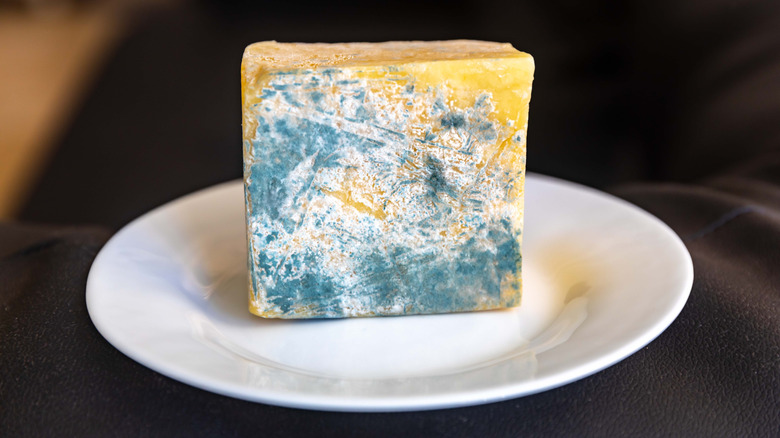Is It Safe To Eat Moldy Cheese Or Should You Toss It?
Although blue cheese is moldy and safe to eat, not every cheese is meant to develop a bit of color. Dr. Nikol Hopkins, DN of MDLifespan, tells us this is a natural part of some ripening processes, but "if there is a foul odor or the cheese is 'runny' — discard!"
Hopkins explains that hard and semisoft cheeses are a bit of an exception, as mold can't penetrate very far into varieties like cheddar, Colby, parmesan, or Swiss. For these, simply cutting away the affected area — "at least 1 inch (2.5 centimeters) around and below the moldy spot" — should be fine. "Be sure to keep the knife out of the mold, so it doesn't contaminate other parts of the cheese," Dr. Hopkins adds. Not only can mold tendrils not penetrate far, but the toxins they produce also have a hard time thriving since firmer varieties lack much moisture.
For soft, fresh, or wet cheeses, however, any sign of mold means it's time to toss them, as "the mold can send threads throughout the cheese — contaminating more than you see," Dr. Hopkins says. "In addition, harmful bacteria, such as listeria, brucella, salmonella, and E. coli, can grow along with the mold." If you accidentally eat mold, you could develop anything from an upset stomach to chronic illness, so always play it safe by first taking the time to store your cheese properly.
How to store cheese so it doesn't grow moldy
For maximum freshness, store your cheese in a cool, hygienic environment and ensure it's wrapped to protect it from the air. Following these three simple rules will help slow the growth of mold spores, which are always present.
Storing cheese in a clean container or even using vinegar to keep mold away prolongs its shelf life, keeping it nice and fresh. However, Dr. Nikol Hopkins suggests never storing it in plastic wrap. "The best way to store cheese is in parchment paper or cheese wrapping paper (made without PFAS) or wrapped in cheesecloth," she says. Cheese wrapping paper, in particular, keeps it clean but still lets excess moisture evaporate to prevent an environment perfect for mold and bacteria. At the same time, it provides enough coverage to prevent the cheese from drying out and ruining its texture.
Still, if you find yourself with a ton of cheese at home, Dr. Hopkins assures us that you can freeze some types, "especially shredded cheese, cream cheese, even cottage cheese." Shredded cheese is relatively dry, so few ice crystals form within it. While you may notice some texture differences between refrigerated and frozen cottage cheese or cream cheese, they're pretty negligible, so don't be afraid to stick them in the freezer if you're worried they'll go bad.


